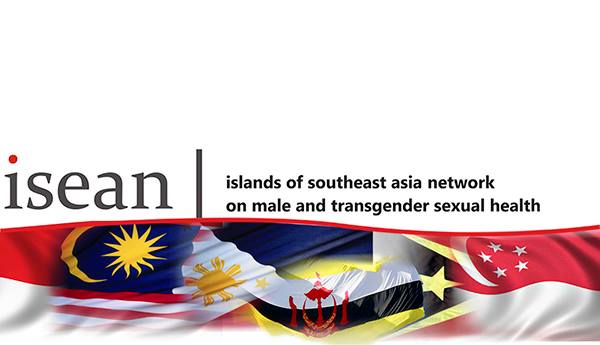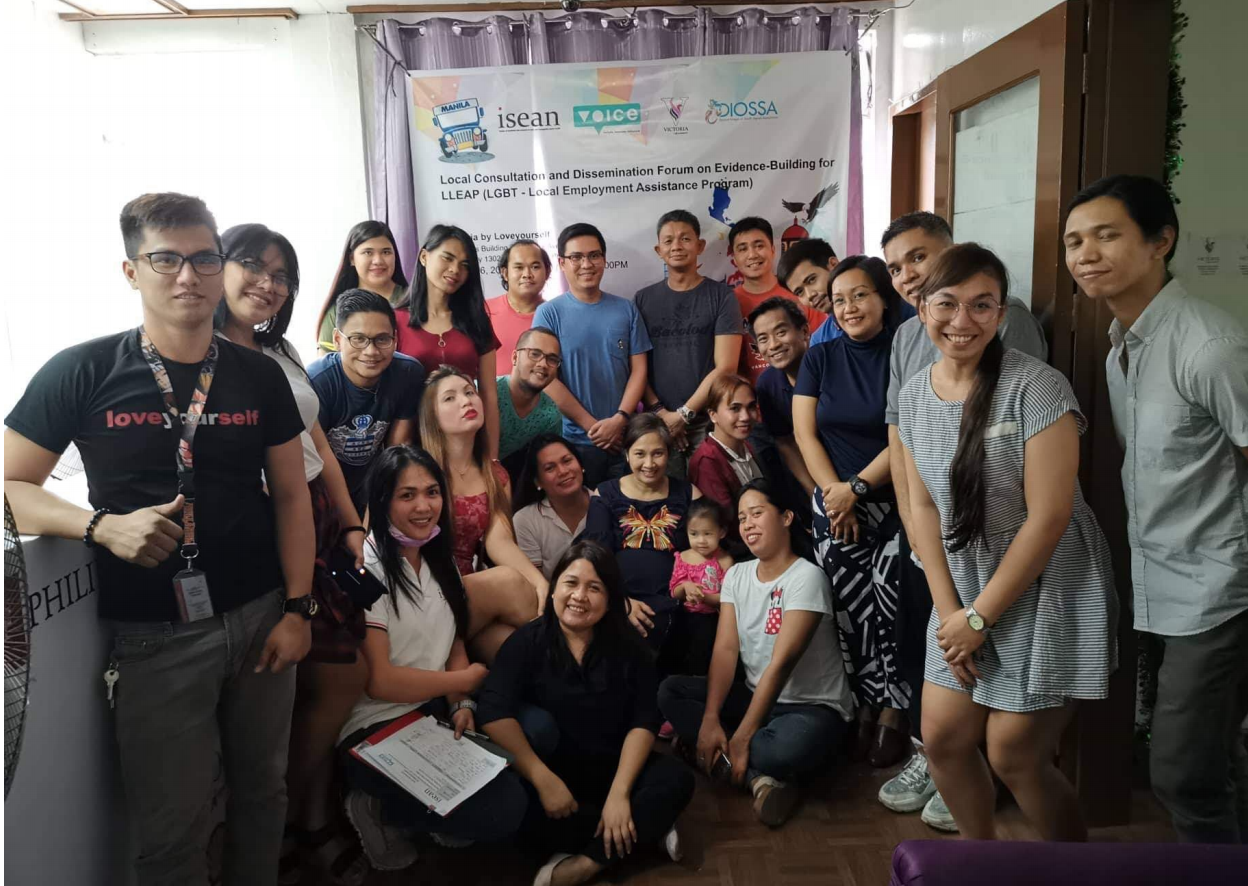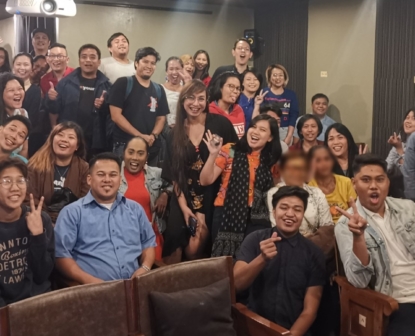Project
Evidence-building and piloting of the LGBTI local employment assistance programme
-
Amount Funded
87,659 EUROProject Duration
01 Apr 2018 - 31 Mar 2019 -
-
The Islands of Southeast Asia Network on Male and Transgender Sexual Health (ISEAN), formerly known as Insular Southeast Asia, is asub-regional network of national networks and community based organisations (CBOs) from Indonesia, Brunei Darussalam, Malaysia, the Philippines, Singapore, and Timor Leste. The network was established to facilitate sharing of information between networks and CBOs to promote effective sexual health response (including HIV and AIDS) and human rights advocacy for males having sex with males (MSM) and transgender (TG) people.
ISEAN’s vision is that societies within the Association of Southeast Asian Nations (ASEAN) are more accepting of Sexual Orientation, Gender Identity and Expression (SOGIE) within the context of human rights, including health, dignity and employment. In addition, the vision states that community members in the ASEAN region are healthier, happier and more empowered to contribute back to society. ISEAN’s mission is to advocate understanding of Sexual Orientation, Gender Identity and Expression (SOGIE), socially and culturally within ISEAN countries; and health and human rights within the ASEAN.
ISEAN Philippines, the Philippine entity of ISEAN, was registered on Oct 2, 2015 in the Philippines, through the regulatory SEC. It aims to create a local entity of ISEAN in the Philippines which would allow it to further develop and implement projects that would benefit the LGBT communities.
-
Organisation
The Islands of Southeast Asia Network on Male and Transgender Sexual Health (ISEAN), formerly known as Insular Southeast Asia, is asub-regional network of national networks and community based organisations (CBOs) from Indonesia, Brunei Darussalam, Malaysia, the Philippines, Singapore, and Timor Leste. The network was established to facilitate sharing of information between networks and CBOs to promote effective sexual health response (including HIV and AIDS) and human rights advocacy for males having sex with males (MSM) and transgender (TG) people.
ISEAN’s vision is that societies within the Association of Southeast Asian Nations (ASEAN) are more accepting of Sexual Orientation, Gender Identity and Expression (SOGIE) within the context of human rights, including health, dignity and employment. In addition, the vision states that community members in the ASEAN region are healthier, happier and more empowered to contribute back to society. ISEAN’s mission is to advocate understanding of Sexual Orientation, Gender Identity and Expression (SOGIE), socially and culturally within ISEAN countries; and health and human rights within the ASEAN.
ISEAN Philippines, the Philippine entity of ISEAN, was registered on Oct 2, 2015 in the Philippines, through the regulatory SEC. It aims to create a local entity of ISEAN in the Philippines which would allow it to further develop and implement projects that would benefit the LGBT communities.
-
Project
Evidence-Building for the LLEAP (LGBT Local Employment Assistance Program) improves the living situation and lessen social discrimination among the local LGBT communities in the Philippines through the provision of livelihood and gainful employment. Implemented by ISEAN Philippines, the first phase of this project focuses on evidence setting through mapping and research activities with the target groups, local employers, and key government agencies. Depending on the results, the second phase shall focus on model development and pilot testing of the employment assistance program.
Aside from these key activities, the project also initiates the creation of a web-based job-search tool (or other possible platforms) specifically designed for LGBT job seekers. This is part of the model development initiative in the second phase of the project. The team will also produce IEC materials, and conduct trainings for both employers and job seekers and monitor the employment situation and concerns of the job-placed LGBT persons.
The project aligns well with the goals of ISEAN Philippines, particularly on its focus to ensure that LGBT communities have improved access to services, employment as well information on HIV and AIDS. ISEAN Philippines is at the forefront of developing and disseminating web-based and paper-based IEC materials that support LGBT welfare, with special focus on transgender populations. It has published newsletters, documentation reports, resource and training materials, including a SOGIE SC and Trans Health Training Module for Healthcare Workers.
-
-
Evidence-Building for the LLEAP (LGBT Local Employment Assistance Program) improves the living situation and lessen social discrimination among the local LGBT communities in the Philippines through the provision of livelihood and gainful employment. Implemented by ISEAN Philippines, the first phase of this project focuses on evidence setting through mapping and research activities with the target groups, local employers, and key government agencies. Depending on the results, the second phase shall focus on model development and pilot testing of the employment assistance program.
Aside from these key activities, the project also initiates the creation of a web-based job-search tool (or other possible platforms) specifically designed for LGBT job seekers. This is part of the model development initiative in the second phase of the project. The team will also produce IEC materials, and conduct trainings for both employers and job seekers and monitor the employment situation and concerns of the job-placed LGBT persons.
The project aligns well with the goals of ISEAN Philippines, particularly on its focus to ensure that LGBT communities have improved access to services, employment as well information on HIV and AIDS. ISEAN Philippines is at the forefront of developing and disseminating web-based and paper-based IEC materials that support LGBT welfare, with special focus on transgender populations. It has published newsletters, documentation reports, resource and training materials, including a SOGIE SC and Trans Health Training Module for Healthcare Workers.
-
According to the Islands of Southeast Asia Network on Make and Transgender Sexual Health (ISEAN), its staff developed further skills in community organising, developing partnerships with stakeholders and conducting research. The engagement of the Community-based Organisations (CBOs) members as researchers in this grant has provided them with knowledge and skills in research. This also include the discipline of doing proper documentation and data analysis that the CBOs can apply in their next endeavors. The project also became their source of income, though short term and part-time, and allowed them to understand their situation more.
ISEAN’s Innovate and Learn project was able to develop the baseline research which can serve as a reference in developing responsive programs to assist LGBTI Filipinos in accessing livelihood and employment opportunities. The following were their learning questions and key answers:
What is the employment situation and needs of the LGBT community (with particular focus on transgender women and men) in four (4) sites in NCR, Puerto Princesa, City (Luzon), Bacolod City (Visayas) and Cagayan de Oro City (Mindanao)?
At the time of the survey, 83% of the respondents have income sources. About 64% of the survey respondents were formally employed at the time of the survey. The remainder were self-employed, worked as freelancers, or were unemployed. The top industries or business where the LGBT community worked include the BPOs or call centers, beauty industry or salon, government offices, restaurant bar, and sales.
What is the situation and employment requirements of local employers, in relation to LGBT communities as their potential workforce?
CBOs cannot officially implement local employment assistance programs without permits or authorization from the PESO (Public Employment Assistance Office) of their Regional DOLE (Department of Labor and Employment) Offices. There are industries such as BPOs, beauty industries, arts-related work, advertising, mass media and creative that is viewed as being more tolerant of LGBT community members or has non-discriminatory hiring policies and practices. However, there are still some LGBT respondents who worked in CBOs that reported experiencing some sort of discrimination compared to their ‘straight counterparts’, particularly in promotions and job permanency.
What are the livelihood and local employment options for LGBT communities and how can these be successfully availed of?
There are existing options for LGBT community members to apply for livelihood and employment assistance with agencies such as the Local Government Units, DOLE and Department of Social Work and Development. However, there are no specific government employment assistance programs targeting LGBTs. This is primarily due to the lack of legislation or laws that label the LGBT community members as needing special assistance in terms of employment.
How can a model of livelihood and employment assistance be described?
For employment assistance, CBOs need to establish formal partnerships with their local DOLE authorities. An MoU needs to be signed and terms of reference clarified. CBOs need to be aware of placement companies or recruitment agencies, if ever they would formally go into this function, and should be responsible for the workers that they placed into offices and companies. For livelihood, there could also be a PILOT IMPLEMENTATION of LGBT-focused livelihood assistance initiative. For both options, there is a need to closely collaborate with national, regional and local agencies, as well as private organizations and companies to provide a replicable livelihood assistance program to MSM and TG communities.
What implementation challenges exist and how can these be addressed?
Majority of the respondents (84%) see the value of and are willing to participate in an employment assistance program if this is to be made available. But respondents said they would prefer it to be CBO-led rather than coming from DOLE or any government agency to lessen the potential stigma and backlash.
What outcome and benefits (to employers, employees and society in general) can be/were realized from the LGBT employment assistance intervention?
For employers, headhunting could be faster and seamless if they course it through a formal partnership between CBOs and local PESO offices as they will have easy access to a pool of talents that could be gainfully employed as needed, especially for the top industries where the LGBT community works. For employees, similarly, they would have access to information on job vacancies and opportunities once formal partnerships are established. For both and for society in general, awareness of the situation of the stigma and discrimination could pave the way to developing programs that could eventually address these issues. Additionally, members of the communities who would be employed by companies could serve as advocates and resource persons for SOGIESC programs for the company.

In May 22, 2019, the results of the study were presented to the Justice Access and Learning Officers on the occasion of their national meeting in Manila. The participants further validated the key findings during the discussions. A positive outcome of the discussion was the recognition that JALOs could certainly help in doing referrals should there be reported violations or cases of stigma and discrimination. However, assistance could be limited to referrals to other government offices and/or institutions for psycho-social counselling.
- News





